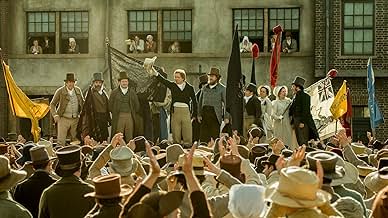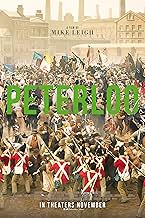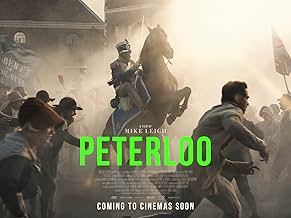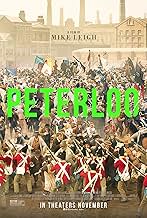IMDb-BEWERTUNG
6,5/10
5815
IHRE BEWERTUNG
Die Geschichte des Peterloo-Massakers von 1819, bei dem britische Truppen eine friedliche Kundgebung für Demokratie in Manchester angriffen.Die Geschichte des Peterloo-Massakers von 1819, bei dem britische Truppen eine friedliche Kundgebung für Demokratie in Manchester angriffen.Die Geschichte des Peterloo-Massakers von 1819, bei dem britische Truppen eine friedliche Kundgebung für Demokratie in Manchester angriffen.
- Auszeichnungen
- 4 Gewinne & 8 Nominierungen insgesamt
Empfohlene Bewertungen
This is the first review I've ever done, but was moved to do so by some reviews that I have read on here since watching the film. So apologies to you experts, but here's my tuppenceworth. On the down side, a bit overlong, could have been a bit less wordy and faster paced. But, I left the cinema with the same feeling that I did in the early 70s after seeing Soldier Blue: stunned by the brutality of "the authorities" over the disenfranchised. Forensic in its drama/documentry approach and absolutely true to events (I have since checked various historical sources). This is what happens when people feel they lack a voice and does resonate with today's UK. I thought the lighting was superb and the epic, grand scale setting rare in a UK film. A must watch for teenagers who will not have heard of this event in history at school.
Peterloo is the Best Mike Leigh picture I've seen. Yes it is too long & speech filled but the Manchester massacre of 1819 is horribly dramatic. You see how the forces of the status quo combine to send in the cavalry & yeomanry to charge at peaceful protestors, maiming hundreds and killing 15. The protestors wanted the right to vote, reform in Parliament (Manchester didn't have an MP) & lower food prices. The film is very well shot with an excellent performance as always from Maxime Peake. Oddly after a long build up to the massacre there is no focus on what happened afterwards.
As with most movies today, the extremes are over-represented and the underlying issues barely addressed. England was reeling from a Napoleanic, banker-funded war, ending in oppressive debt for the major powers of Europe. The Bank of England and the Bank of France were both formed to lend money to their respective governments, with few constraints on the pyramiding, in order to fund regular wars. The French revolution was trying to spread its socialist conclusions. Men are represented as either cruel, money-grubbing wealthy industrialists or poor, woe-is-me peasant labor, although one could hardly call people who had several sets of clothes, a house and sets of dishes as poor. The gratuitous men-oppress-their-more-intelligent-women folk is consistent with modern social justice bleatings. Consequently, what we see is the plight of what the French called the bourgeoisie, or the merchant and skilled labor class. The entrenched oligarchies were hanging on to their power, generated by industrial technological expansions (in this case the mechanical loom), which ironically needed skilled laborers and supporting merchants, who also were gaining wealth, counter to the woe-is-me picture. Much of the problem was the government-imposed lack of producers' and laborers' ability to negotiate the price of their labor and the markets for their products. The many government-oligopoly controls on cloth production are not presented, but were responsible for most of the tension. Of course, these issues would hardly sell to uninformed viewers.
As with the onset of the French revolution, the key issue is never quite resolved in these movies, or in the social justice bleatings of today: after the dust settles, who will be in charge and what will the new rules be? Will the current oppressors be replaced by worse oppressors? Meet the new boss, same as the old boss, both in labor and management. Government meddling has and will cause tragedy.
As with the onset of the French revolution, the key issue is never quite resolved in these movies, or in the social justice bleatings of today: after the dust settles, who will be in charge and what will the new rules be? Will the current oppressors be replaced by worse oppressors? Meet the new boss, same as the old boss, both in labor and management. Government meddling has and will cause tragedy.
Quite a long film, but it didn't drag. Tells the story well, but there are really no lead characters, and many of the characters are rather two-dimensional or even caricatures. Visually, it is excellent. I didn't know much about the Peterloo massacre before seeing the film. I now feel educated, and felt that it was two and a half hours well spent, although not a film without flaws. Stronger (more realistically human) characters could perhaps have made the film more engaging, but maybe telling the (hi)story was more important here.
A slow work up to the massacre. Incredible massacre scene. Would have like more on the aftermath as the film ended abruptly. Overlong I thought.
Wusstest du schon
- WissenswertesThe film was released 200 years after the Peterloo Massacre.
- PatzerThe young Waterloo veteran who continues to wear his redcoat during the film can be seen in one shot with Corporal stripes whereas the rest of the film his tunic is that of a Private.
- Zitate
Prince Regent: I know what is good for my people better than they know themselves!
- VerbindungenFeatured in Granada Reports: 16 August 2018: Evening Bulletin (2018)
Top-Auswahl
Melde dich zum Bewerten an und greife auf die Watchlist für personalisierte Empfehlungen zu.
Details
- Erscheinungsdatum
- Herkunftsland
- Offizielle Standorte
- Sprache
- Auch bekannt als
- La tragèdia de Peterloo
- Drehorte
- Hebden Bridge, West Yorkshire, England, Vereinigtes Königreich(Workers being drilled before marching)
- Produktionsfirmen
- Weitere beteiligte Unternehmen bei IMDbPro anzeigen
Box Office
- Bruttoertrag in den USA und Kanada
- 151.971 $
- Eröffnungswochenende in den USA und in Kanada
- 26.002 $
- 7. Apr. 2019
- Weltweiter Bruttoertrag
- 2.159.214 $
- Laufzeit2 Stunden 34 Minuten
- Farbe
- Sound-Mix
- Seitenverhältnis
- 1.85 : 1
Zu dieser Seite beitragen
Bearbeitung vorschlagen oder fehlenden Inhalt hinzufügen








































